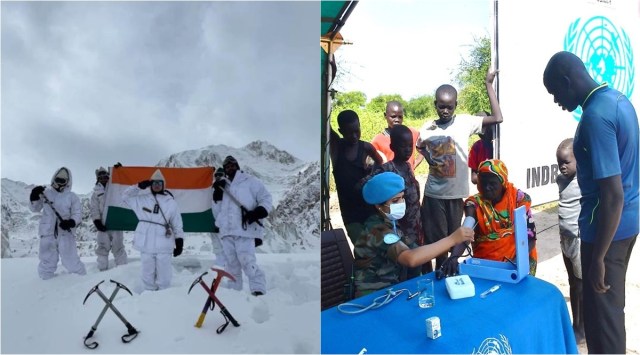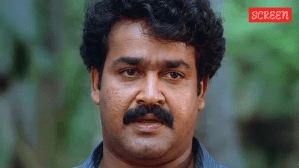But two months later, the officer from the Corps of Engineers says her only challenge at the icy glacier is not any different from what any of her male counterparts would face—the freezing, unpredictable weather at the glacier. “Coming to the glacier was the most memorable experience. It is challenging, but I am trained for it,” she told The Indian Express over a phone call from the glacier.

 Captain Shiva Chauhan at Kumar Post on the Siachen Glacier. @firefurycorps_IA
Captain Shiva Chauhan at Kumar Post on the Siachen Glacier. @firefurycorps_IA
Captain Chouhan is the first woman officer in the Army to be deployed at the glacier. She underwent training at the Siachen base camp to get acclimatised before getting deployed here.
Her usual day begins around 9.30 am once the sun is out and weather conditions dictate when she should wrap up her day. Temperatures are usually beyond minus 30-degree Celsius here.
“Every single day, we go to posts where my boys are deployed and physically oversee various works underway. One needs to be mentally tough to survive here, even as we are physically conditioned to serve in this terrain,” she said.
The infrastructure at the glacier can be frugal, but Captain Chouhan says her colleagues have been warm and welcoming.
“When I learnt about my posting to Siachen, I stocked up my medical kit adequately. Then we have sleeping bags, heated tents, kerosene heaters to keep us comfortable,” she said.
Story continues below this ad
Like Captain Chouhan, Major Bhavna Syal is serving in a super high-altitude area of eastern Ladakh, where temperature during the nights can go down to minus 10 degree Celsius and the days are slightly “warmer” at zero degree Celsius.
 27 personnel in the Abyei peacekeeping unit. (Indian envoy to UN)
27 personnel in the Abyei peacekeeping unit. (Indian envoy to UN)
A third-generation Army officer from the Corps of Signals, Major Syal, in 13 years of her Army career has been posted in J&K and also served in the UN mission in Lebanon for 19 months. She also led a contingent on the 70th Republic Day parade at Rajpath (now Kartvyapath). The officer takes pride in her work.
“Military communication is the backbone of all operations. We must ensure that the commanders are able to speak to soldiers at the Line of Actual Control… ensuring round-the-clock data communication is also a critical task,” she said.
Asked about the challenges, she says the training and acclimatisation helps her withstand the tough terrain and weather conditions, adding that all Army personnel posted there maintain high levels of physical fitness.
Story continues below this ad
Major Abhilasha Barak, who flies the Advanced Light Helicopter (ALH) Mk III close to the Line of Control (LoC) says every single day is a new challenge, but a satisfying experience too.
Major Barak joined the Army aviation in 2018 as a ground duty officer, but opted to train as a pilot when the Army in 2020 opened the doors for women to become aviators. After a year-long training at Nashik on the Chetak and Cheetah helicopters, she started flying the modern ALH last year.
“We fly to the frontline every single day to help the ground troops with inserting of troops for major operations or for casualty evacuation. Flying close to hostile areas is a challenge, but the satisfaction of being able to evacuate a gunshot casualty for timely medical intervention is immense,” she said.
In her sorties, she navigates through the shallow approaches to the hills and, at times, can clearly see the enemy locations on the other side. “Every sortie is an experience,” she asserted.
Story continues below this ad
Lt Col Priyadarshini, who holds a sensitive appointment in the Northeast, is one of the four women officers who have been recently selected to undergo the Defence Services Staff College course at Wellington, Tamil Nadu, despite losing her father three days before the exam.
In her 15 years of service, she has served in eastern Ladakh, Kashmir, Hisar, as well as in the Northeast and Trivandrum. In one of her tenures, she also served with former CDS late General Bipin Rawat for a specialised role. She says she will never trade her current job for any other role.
“Yes, serving at difficult locations comes with its own set of challenges; at times there have been social issues, but we manage… thanks to the constant organisational support and a strong backup at home,” she said.
In her tenure, she had undertaken multiple challenging operations. Close to her heart is one that helped the Army nab two members of a Northeast-based insurgent group from a Tamil Nadu hinterland. “It was a difficult operation, as I had to first go alone for the job, while backups were to follow. A senior officer had bestowed immense trust in me and had expressed confidence in my ability to execute this. The operation was successful and a memorable experience.”
Story continues below this ad
A unique set of challenges comes in for officers operating in conflict zones outside the country, such as in UN Missions.
 Captain Chouhan will be leading the team of Sappers entrusted with the task of carrying out various combat engineering assignments. (Fire and Fury Corps/ Twitter)
Captain Chouhan will be leading the team of Sappers entrusted with the task of carrying out various combat engineering assignments. (Fire and Fury Corps/ Twitter)
Major Shailli Gehlawat, from the Army Medical Corps, is responsible for management of all medical facilities in the conflict-torn Abyei for the last seven months.
“This is a conflict area, where the security situation changes with the blink of an eye. The weather and terrains are difficult too; for six months, the weather is extremely hot and dry and the rest of the year, it is raining incessantly,” she said.
“Yet, I would say it is a wonderful experience, which not only has changed my perceptions, but has been a huge learning experience,” she said, adding that the officers undergo rigorous training to tackle the challenges in such regions.
Story continues below this ad
“Unannounced spurts of violence, including firing and throwing of grenades remain the biggest challenge for us here,” she says.
The violence sometimes accelerates suddenly and this can lead to mass casualties in one go.
“Mostly, such incidents take place post regular work hours. At times, the rains lead to logistical and communication challenges. Helicopter evacuations become difficult and live mines add to the difficulties,” she said.
Major Gehlawat recalled such a challenging incident in November last year when the hospital received 13 casualties one night.
Story continues below this ad
The entire night, the people who were brought in batches were operated on and saved. “It is a gratifying experience to do our best and be able to help the local population, especially during such emergency situations. People here try to do their best using available resources purely on humanitarian grounds,” she said.
The officer, who has earlier served in a counter-insurgency area and in a strike corps, said the security challenges there are intense.
“But the training and following of basic SoPs like wearing bulletproof jackets at all times stands in strong stead and makes things seamless for us.”



 Captain Shiva Chauhan at Kumar Post on the Siachen Glacier. @firefurycorps_IA
Captain Shiva Chauhan at Kumar Post on the Siachen Glacier. @firefurycorps_IA 27 personnel in the Abyei peacekeeping unit. (Indian envoy to UN)
27 personnel in the Abyei peacekeeping unit. (Indian envoy to UN) Captain Chouhan will be leading the team of Sappers entrusted with the task of carrying out various combat engineering assignments. (Fire and Fury Corps/ Twitter)
Captain Chouhan will be leading the team of Sappers entrusted with the task of carrying out various combat engineering assignments. (Fire and Fury Corps/ Twitter)





